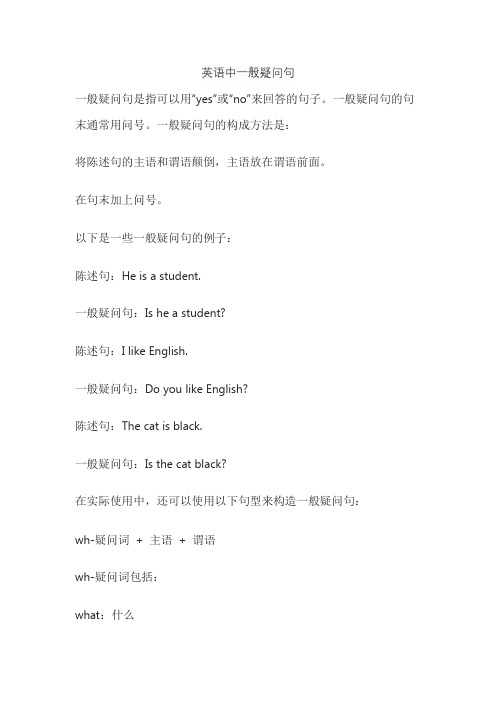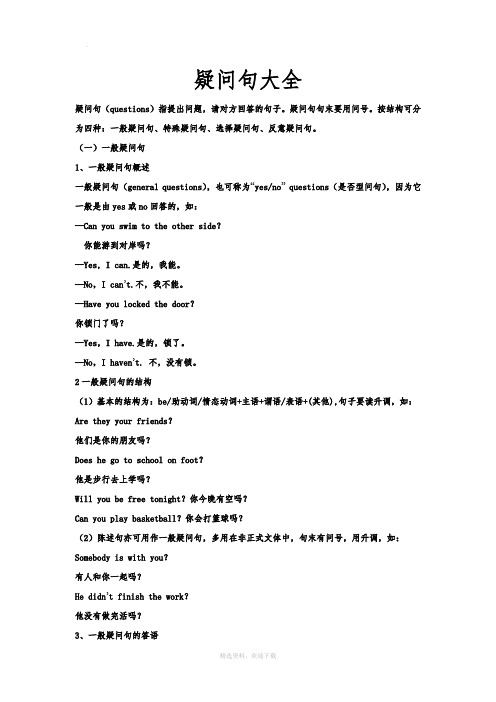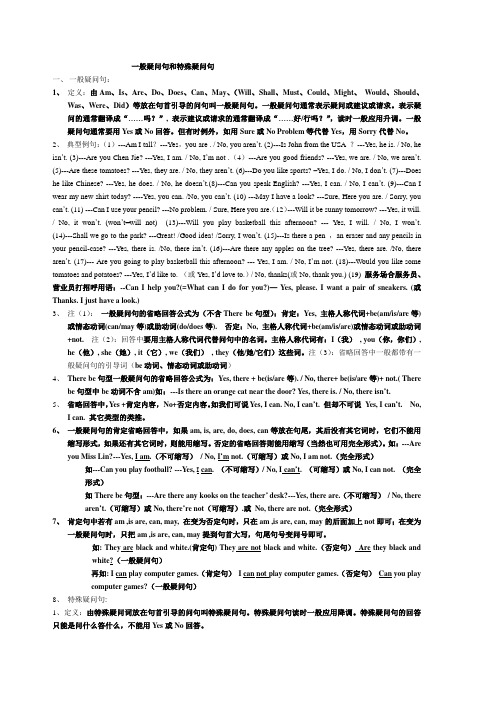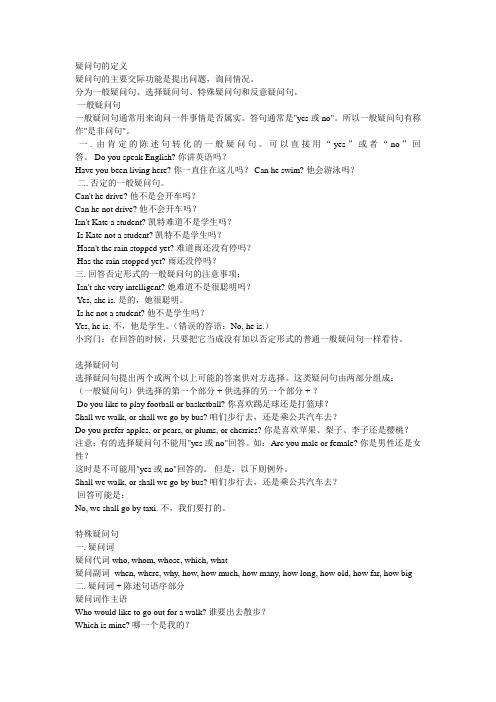疑问句大全——-一般疑问句
英语中一般疑问句

英语中一般疑问句
一般疑问句是指可以用“yes”或“no”来回答的句子。
一般疑问句的句末通常用问号。
一般疑问句的构成方法是:
将陈述句的主语和谓语颠倒,主语放在谓语前面。
在句末加上问号。
以下是一些一般疑问句的例子:
陈述句:He is a student.
一般疑问句:Is he a student?
陈述句:I like English.
一般疑问句:Do you like English?
陈述句:The cat is black.
一般疑问句:Is the cat black?
在实际使用中,还可以使用以下句型来构造一般疑问句:
wh-疑问词+ 主语+ 谓语
wh-疑问词包括:
what:什么
who:谁
where:在哪里
when:什么时候
why:为什么
how:如何
以下是一些使用wh-疑问词构造一般疑问句的例子:陈述句:The book is on the table.
一般疑问句:What is on the table?
陈述句:The man is my father.
一般疑问句:Who is your father?
陈述句:I went to the park yesterday.
一般疑问句:When did you go to the park?
陈述句:I like to eat apples.
一般疑问句:Why do you like to eat apples?
陈述句:I can run very fast.
一般疑问句:How fast can you run?。
疑问句大全、一般疑问句

疑问句大全疑问句(questions)指提出问题,请对方回答的句子。
疑问句句末要用问号。
按结构可分为四种:一般疑问句、特殊疑问句、选择疑问句、反意疑问句。
(一)一般疑问句1、一般疑问句概述一般疑问句(general questions),也可称为“yes/no” questions(是否型问句),因为它一般是由yes或no回答的,如:—Can you swim to the other side?你能游到对岸吗?—Yes, I can.是的,我能。
—No,I can’t.不,我不能。
—Have you locked the door?你锁门了吗?—Yes,I have.是的,锁了。
—No,I haven’t. 不,没有锁。
2一般疑问句的结构(1)基本的结构为:be/助动词/情态动词+主语+谓语/表语+(其他),句子要读升调,如:Are they your friends?他们是你的朋友吗?Does he go to school on foot?他是步行去上学吗?Will you be free tonight?你今晚有空吗?Can you play basketball?你会打篮球吗?(2)陈述句亦可用作一般疑问句,多用在非正式文体中,句末有问号,用升调,如:Somebody is with you?有人和你一起吗?He didn’t finish the work?他没有做完活吗?3、一般疑问句的答语(1)一般疑问句一般由yes或no来回答,如:—Are you tired?你累了吗?—Yes,I am.是的,累了。
—No, I’m not.不,不累。
—Does she do the cleaning?她扫除了吗?—Yes ,she does.是的,她打扫了。
—No,she doesn’t.不,她没打扫。
2)回答一般疑问句除了用yes或no外,也可用certainly,probably,perhaps,of course,all right,with pleasure等代替yes,用never,not at all等代替no,如:—Can you help me?你能帮个忙吗?—Certainly.当然。
英语常见疑问句

疑问句---回答1、一般疑问句一般疑问句以一个助动词,情态动词,动词be或have开头。
回答一般用yes或no;间或用sure, certainly, of course, perhaps等回答。
如:(1)—Did you have a good time at the party, last night? 晚会上玩得好吗?—Yes,we enjoyed every minute. 是的,我们一直玩得很好。
(2)—Do you mind my smoking here, sir? 我在这里吸烟你介意吗?-Not at all,please go ahead.不介意,请吸吧。
/No, I don’t.(注意不是No, I am not)2、特殊疑问句特殊疑问句由“疑问代词或疑问副词 + 一般疑问句”构成,句子要用倒装语序。
但如果主语是疑问代词或由疑问代词修饰,则用陈述语序。
特殊疑问句直接回答。
如:(1)What are you going to do next week?你下星期干什么?-I am going to see my mother in hospital.(2)How soon will you finish writing the book?还有多久才能写完这本书?—In a year.3、选择疑问句选择疑问句就是在一般疑问句后用or连接一个选择部分。
选择问句回答较灵活,可以任选其一回答;可以用either(两者中的任何一个);可以用both(两者都…);还可以用 neither(两者都不…)。
如:(1)-Which do you like, tea or coffee? 你喜欢喝什么?茶还是咖啡?-Tea,please.(2)一Do you like the red one or the blue one?你喜欢红色的还是蓝色的。
-Either will do.4、反意疑问句反意疑问句分为两种。
修改后讲练4页一般疑问句和特殊疑问句

一般疑问句和特殊疑问句一、一般疑问句:1、定义:由Am、Is、Are、Do、Does、Can、May、(Will、Shall、Must、Could、Might、Would、Should、Was、Were、Did)等放在句首引导的问句叫一般疑问句。
一般疑问句通常表示疑问或建议或请求。
表示疑问的通常翻译成“……吗?”, 表示建议或请求的通常翻译成“……好/行吗?”,读时一般应用升调。
一般疑问句通常要用Yes或No回答。
但有时例外,如用Sure或No Problem等代替Yes,用Sorry代替No。
2、典型例句:(1)---Am I tall?---Yes,you are . / No, you aren’t. (2)---Is John from the USA ?---Yes, he is. / No, he isn’t. (3)---Are you Chen Jie? ---Yes, I am. / No, I’m not .(4)---Are you good friends? ---Yes, we are. / No, we aren’t.(5)---Are these tomatoes? ---Yes, they are. / No, they aren’t. (6)---Do you like sports? –Yes, I do. / No, I don’t. (7)---Does he like Chinese? ---Yes, he does. / No, he doesn’t.(8)---Can you speak English? ---Yes, I can. / No, I can’t. (9)---Can I wear my new shirt today? ----Yes, you can. /No, you can’t. (10) ---May I have a look? ---Sure, Here you are. / Sorry, you can’t. (11) ---Can I use your pencil? ---No problem. / Sure, Here you are.(12)---Will it be sunny tomorrow? ---Yes, it will. / No, it won’t. (won’t=will not) (13)---Will you play basketball this afternoon? --- Yes, I will. / No, I won’t.(14)---Shall we go to the park? ---Great! /Good idea! /Sorry, I won’t. (15)---Is there a pen ,an eraser and any pencils in your pencil-case? ---Yes, there is. /No, there isn’t. (16)---Are there any apples on the tree? ---Yes, there are. /No, there aren’t. (17)--- Are you going to play basketball this afternoon? --- Yes, I am. / No, I’m not. (18)---Would you like some tomatoes and potatoes? ---Yes, I’d like to. (或Yes, I’d love to.)/ No, thanks(或No, thank you.) (19)服务场合服务员、营业员打招呼用语:--Can I help you?(=What can I do for you?)—Yes, please. I want a pair of sneakers. (或Thanks. I just have a look.)3、注(1):一般疑问句的省略回答公式为(不含There be句型):肯定:Yes, 主格人称代词+be(am/is/are等)或情态动词(can/may等)或助动词(do/does等). 否定:No, 主格人称代词+be(am/is/are)或情态动词或助动词+not. 注(2):回答中要用主格人称代词代替问句中的名词。
疑问句语法大全

疑问句的定义疑问句的主要交际功能是提出问题,询问情况。
分为一般疑问句、选择疑问句、特殊疑问句和反意疑问句。
一般疑问句一般疑问句通常用来询问一件事情是否属实。
答句通常是"yes或no"。
所以一般疑问句有称作"是非问句"。
一. 由肯定的陈述句转化的一般疑问句。
可以直接用“yes”或者“no”回答。
Do you speak English? 你讲英语吗?Have you been living here? 你一直住在这儿吗? Can he swim? 他会游泳吗?二. 否定的一般疑问句。
Can't he drive? 他不是会开车吗?Can he not drive? 他不会开车吗?Isn't Kate a student? 凯特难道不是学生吗?Is Kate not a student? 凯特不是学生吗?Hasn't the rain stopped yet? 难道雨还没有停吗?Has the rain stopped yet? 雨还没停吗?三. 回答否定形式的一般疑问句的注意事项:Isn't she very intelligent? 她难道不是很聪明吗?Yes, she is. 是的,她很聪明。
Is he not a student? 他不是学生吗?Yes, he is. 不,他是学生。
(错误的答语:No, he is.)小窍门:在回答的时候,只要把它当成没有加以否定形式的普通一般疑问句一样看待。
选择疑问句选择疑问句提出两个或两个以上可能的答案供对方选择。
这类疑问句由两部分组成:(一般疑问句)供选择的第一个部分 + 供选择的另一个部分 + ?Do you like to play football or basketball? 你喜欢踢足球还是打篮球?Shall we walk, or shall we go by bus? 咱们步行去,还是乘公共汽车去?Do you prefer apples, or pears, or plums, or cherries? 你是喜欢苹果、梨子、李子还是樱桃?注意:有的选择疑问句不能用"yes或no"回答。
英语各种疑问句详细解释——_一般疑问句、特殊疑问句、选择疑问句、反意疑问句

各种疑问句的详细介绍疑问句(questions)指提出问题,请对方回答的句子。
疑问句句末要用问号。
按结构可分为四种:一般疑问句、特殊疑问句、选择疑问句、反意疑问句。
(一)一般疑问句1、一般疑问句概述一般疑问句(general questions),也可称为“yes/no” questions(是否型问句),因为它一般是由yes或no回答的,如:—Can you swim to the other side?你能游到对岸吗?—Yes, I can.是的,我能。
—No,I can’t.不,我不能。
—Have you locked the door?你锁门了吗?—Yes,I have.是的,锁了。
—No,I haven’t. 不,没有锁。
2一般疑问句的结构(1)基本的结构为:be/助动词/情态动词+主语+谓语/表语+(其他),句子要读升调,如:Are they your friends?他们是你的朋友吗?Does he go to school on foot?他是步行去上学吗?Will you be free tonight?你今晚有空吗?Can you play basketball?你会打篮球吗?(2)陈述句亦可用作一般疑问句,多用在非正式文体中,句末有问号,用升调,如:Somebody is with you?有人和你一起吗?He didn’t finish the work?他没有做完活吗?You are fresh from America,I suppose?我猜,你刚从美国回来吧?3、一般疑问句的答语(1)一般疑问句一般由yes或no来回答,如:—Are you tired?你累了吗?—Yes,I am.是的,累了。
—No, I’m not.不,不累。
—Does she do the cleaning?她扫除了吗?—Yes ,she does.是的,她打扫了。
—No,she doesn’t.不,她没打扫。
一般疑问句的四种基本句型
一般疑问句的四种基本句型一般疑问句的四种基本句型:【句型一】Be + 主语+ …;【句型二】Do / Does / Did + 主语+ 谓语+…;【句型三】情态动词+ 主语+ 谓语+…;【句型四】Have / Has + 主语+ 功去分词+…。
【句型一】Be + 主语+ …?例句:1.Are these books on the desk? 这些书在桌子上吗?2.Is your mother at home? 你妈妈在家吗?3.Was he here a moment ago? 他刚才在这儿吗?【用法说明】在含有连系动词be的未来时(shall / will + be) 或完成时态(have / has + been) 的句子,改为一般疑问句时,只需将shall / will 或have / has提到句首。
如:1.Will they be at home tonight? 他们今晚在家吗?2.Has he been to New York? 他去功纽约吗?【句型二】Do / Does / Did + 主语+ 谓语+…?例句:1.Do you like English? 你喜欢英语吗?2.Did he pass the exam? 他通功了这次考试吗?3.Does she have a computer? 她有一台电脑吗?【用法说明】助动词do 要随人称和时态而变化。
在一般现在时中,除第三人称双数用does 外,其他人称用do。
而在一般功去时中,任何人称皆用did。
异时,还应注意把本陈述句的行为动词改为动词本形。
【句型三】情态动词+ 主语+ 谓语+…?例句:1.Must I finish my homework now? 我必须现在完成我的家庭作业吗?2.Dare you swim in the lake? 你敢在这个湖里游泳吗?3.May I come in? 我可以进来吗?【用法说明】有的情态动词(如need, dare) 既可作情态动词,也可作行为动词,因此它们的一般疑问句有两种形式。
语法专题4:一般疑问句
一般疑问句(General questions )一般疑问句是疑问句的一种。
它是指用yes (是)或no (否)来回答的句子。
其结构是:系动词be(包括is, am, are) /助动词(do, does, did)/情态动词(can, could, should ….)+主语+其他成分通常回答为:肯定:Yes, +主语+提问的助动词.否定:No, +主语+提问的助动词+not.--Are you from Japa n? ---Yes I am. / No rm not.--Does he work in a bank? --Yes he does / No he does n't.--Do you live n ear your school? --Yes I do. / No I don't.一般疑问句有两个家族。
1. 第一家族为含be动词或情态动词的一般疑问句,其结构为:be +主语+其它部分?情态动词+主语+动词原形+其它部分?肯定回答用“Ye,主语情态动词.”否定回答用“ No主语情态动词+not. ”be或情态动词和not可用缩写形式,主要有isn ' aren ' wasn', t eren', can', mustn', t needn'等。
Eg1.问句:Is this your En glish book?肯答:Yes , it is.否答:No, it is n't. / No, it is not.Eg2.问句:Are these your En glish bookQ肯答:Yes , they are.否答:No, they aren ' t.Eg3.问句:Can you speak En glish?肯答:Yes , I ca n.否答:No, I can ' t.注意例句1和例句2,在回答时必须将this'that与these'those分别变为it和they。
一般疑问句
一般疑问句1、Did you read books? 你读书了吗?Yes, I did. 是的,我读过了。
No, I didn’t.不,我没有读过。
2、Is she quiet? 她文静吗?No,she isn’t. She’s very active.不,她不。
她很活跃。
she strict? 她严格吗?Yes,she is, but she’s verykind. 是的,她是,但是她很和蔼。
3、Is this a teacher’s de sk? 这是一张讲台桌吗?Is it cold? 冷吗?、Is her birthday in June? 她的生日在六月吗?、Is this your shirt? 这是你的T恤衫吗?Yes,it is. 是的。
No, it isn’t. / No, it’s not.不,不是的。
4、 Can you make the bed?你会铺床吗? Can you use a computer? 你会使用电脑吗?Yes, I can. 是的,我会。
No, I can’t.不,我不会。
5、Are they ducks? 它们是鸭子吗? Are they eating the honey?它们吃蜂蜜吗?Yes,they are. 是的,它们是。
No,they aren’t.不,它们不是。
6、Is there a forest in the park? 公园里有一个森林吗?Is there a river? 那里有条河吗?Yes,there is. 是的,那里有。
No,there aren’t.不,那里没有。
7、Are there any pandas in the mountains? 山里有一些熊猫吗?Are there any fish in the rivers? 河里有一些鱼吗?Yes,there are. 是的,那里有。
No,there aren’t.不,那里没有。
(完整)英语一般疑问句(语法)
一般疑问句首先我们要弄懂什么是一般疑问句式.当我们想说“你是……吗?”,“你做……了吗?”的时候,就要用一般疑问句式。
为了便于同学们学习,我分类讲解一下一般现在时的一般疑问句式.一、含有be动词的一般疑问句,通常把be动词调到句首。
例如:陈述句:They are in the swimming pool。
一般疑问句:Are they in the swimming pool?Yes, they are./No, they aren't。
注意:一般疑问句句末要用“?”。
二、含有情态动词的一般疑问句(can,may..。
),把情态动词调到句首。
例如:陈述句: He can drive a car.一般疑问句:Can he drive a car?Yes,he can。
/No,he can’t。
三、含有have的一般疑问句,have译为“有"。
一般疑问句式有两种形式:1。
把have/has调到句首。
例如:陈述句:Tommy has a computer。
一般疑问句:Has Tommy/he a computer?2。
加助动词do/does,第三人称单数用does,其他人称用do。
其句型为:Do/Does + 主语+ ha ve.。
?例如上句可变为:Does Tommy have a computer?Yes,he does./No, he doesn’t四、一般动词的一般疑问句,也要借助助动词do/does,第三人称单数用does,其余人称用do。
其句型为:Do/Does + 主语+ 动词原形+其它?陈述句:Amy speaks English。
一般疑问句:Does Amy speak English?Yes, she does./No, she doesn’t好了,知道了如何问话之后,我们来了解一下如何回答一般疑问句。
首先要有人称的改变。
当主语为名词时,在答语中要改成其相应的代词。
- 1、下载文档前请自行甄别文档内容的完整性,平台不提供额外的编辑、内容补充、找答案等附加服务。
- 2、"仅部分预览"的文档,不可在线预览部分如存在完整性等问题,可反馈申请退款(可完整预览的文档不适用该条件!)。
- 3、如文档侵犯您的权益,请联系客服反馈,我们会尽快为您处理(人工客服工作时间:9:00-18:30)。
疑问句大全——-一般疑问句疑问句大全疑问句(questions)指提出问题,请对方回答的句子。
疑问句句末要用问号。
按结构可分为四种:一般疑问句、特殊疑问句、选择疑问句、反意疑问句。
(一)一般疑问句1、一般疑问句概述一般疑问句(general questions),也可称为“yes/no” questions(是否型问句),因为它一般是由yes或no回答的,如:—Can you swim to the other side?你能游到对岸吗?—Yes, I can.是的,我能。
—No,I can’t.不,我不能。
—Have you locked the door?你锁门了吗?—Yes,I have.是的,锁了。
—No,I haven’t. 不,没有锁。
2一般疑问句的结构(1)基本的结构为:be/助动词/情态动词+主语+谓语/表语+(其他),句子要读升调,如:Are they your friends?他们是你的朋友吗?Does he go to school on foot?他是步行去上学吗?Will you be free tonight?你今晚有空吗?Can you play basketball?你会打篮球吗?(2)陈述句亦可用作一般疑问句,多用在非正式文体中,句末有问号,用升调,如:Somebody is with you?有人和你一起吗?He didn’t finish the work?他没有做完活吗?3、一般疑问句的答语(1)一般疑问句一般由yes或no来回答,如:—Are you tired?你累了吗?—Yes,I am.是的,累了。
—No, I’m not.不,不累。
—Does she do the cleaning?她扫除了吗?—Yes ,she does.是的,她打扫了。
—No,she doesn’t.不,她没打扫。
2)回答一般疑问句除了用yes或no外,也可用certainly,probably,perhaps,of course,allright,with pleasure等代替yes,用never,not at all等代替no,如:—Can you help me?你能帮个忙吗?—Certainly.当然。
—Could you please make less noise?你可以小声一点吗?—All right,sir.好的,先生。
—Have you been there?你到过那里吗?—Never.从来没有。
4、一般疑问句的否定式(1)一般疑问句的否定式,一般结构为系动词/助动词/情态动词+not+主语;也可为系动词/助动词/情态动词+主语+not,如:Do you not/Don’t you believe me? 你不相信我?Believe me?你不相信我?Is it not / Isn’t it a lovely day? 天气难道不好吗?Are you not / Aren’t you coming?你不来吗?Will you not /Won’t you sit down? 你不坐会儿吗?Is he not / Isn’t he a doctor? 他不是医生吗?(2)否定疑问句并不单纯表示提问,它常常带有感情色彩。
否定疑问句的完全式比简略式所表达的语气更强烈些。
(3)否定的一般疑问句的答语中,yes的含义为“不”,no的含义为“是”,但在回答这类句子时,应该注意yes后接肯定结构,no后接否定结构,这和汉语习惯不同,如:—Are you not Mr Smith?你不是史密斯先生吗?—Yes,I am.不,我是。
—No,I am not.是的,我不是。
—Haven’t you read this book before?你从前没有读过这本书吗?—Yes,I have.不,我读过。
—No,I haven’t.是的,我没有。
—Don’t you play chess?你不下棋吗?—Yes ,I do.不,我下棋。
—No,I don’t.是的,我不下棋。
教你一招:在这样的答语中,只要根据实际情况来判断,如果事实上是,就要用yes;如果事实上不是,就要用no。
(二)特殊疑问句1、特殊疑问句概述特殊疑问句(special questions),也可称为“wh”-questions,因为它们多数都以who,where,when,which,whose,why这类词开头,如:Who is it on the phone?谁来的电话?How many oranges can you see in the picture?你能在图画上看到多少个橘子?Where did you last see it?你最后一次看到这东西时是在什么地方呢?What did you eat yesterday?你昨天吃了些什么?How do you usually go to school?你通常是怎么去学校的呢?2、特殊疑问句的构成及用法(1)它的结构一般为:特殊疑问词+一般疑问句,即:特殊疑问词+be/助动词/情态动词+主语+谓语/表语+(其他),如:What can be done about it?对此能做些什么呢?Which are yours?哪些是你的?Who would like to come for a game of football?谁愿意来踢场足球呀?What did you say?你说什么?Why didn’t you tell me?你为什么没有告诉我?(3)“why+一般疑问句否定式”这种结构一般表示劲告、建议、责备等,而不能归为特殊问句,如:Why don’t you come earlier?你为什么不早些来呢?Why not go skiing?为何不去滑雪呢?3、特殊疑问词特殊疑问词可分为两类:疑问代词和疑问副词(1)疑问代词疑问代词主要有五个,分别为:who,whom,which,what,whose。
它们没有性和数的变化,除了who外也没有格的变化。
Who is the girl under the tree?Who is not here?Whom谁作宾语,用来指人Whom are you writing to?Whom do you want to see?Whose谁的用来指所属关系,如果作定语,一般后接名词Whose pen is this?Whose are those shoes?Which哪个,哪些用来指对人或物在一定范围之内进行选择Which girls will be in the sports meeting?Which hat is lily’s?What通常指物,也可指人,一般用在没有指出范围的情况下What can you see in the picture?What is in the teacher’s room?(2)疑问副词疑问副词包括when,where,why,how及how 与其他副词和形容词组成的疑问词。
疑问副词when何时询问时间When will she return?Where何地询问地点Where do you come from?Why为什么询问原因Why are you late for school?How如何询问手段、方式、工具以及程度等How do you usually go to school?How old多大询问年龄How old is Jim’s little brother?How much/many多少询问数量How many friends do you have?How far多远询问距离How far is it from your home to school?How long多长、多久询问时间的长度或距离How long will you stay in Beijing?How often多长时间一次询问频率How often do you go to see your grandparents?How soon多久询问时间How soon will you come back4、特殊疑问句的答语特殊疑问句的答语的重点是对疑问词的回答非所问,因此,不再需要用yes或no。
在回答时,可以用一个词或词组,也可以用一个较为完整的句子。
Who has borrowed my bike?谁借了我的自行车?Jack. 杰克。
Jack has borrowed your bike.When did he borrow my bike?他什么时候借了我的自行车?This morning. 今天早晨。
He borrowed your bike this morning.Where is he?他现在在何处?At the office. 在办公室。
He is at the office.What is he doing there?他在那儿干什么呢?Working. 工作He is working.Whose bike is this?这辆自行车是谁的?Mr. Smith’s. 史密斯先生的。
It’s Mr. Smith’s bike.(三)选择疑问句1、选择疑问句概述选择疑问句(alternative questions)一般提出两种或两种以上的可能,问对方选择哪一种。
其结构可用一般疑问句,也可用特殊疑问句,供选择的两部分由or连接,前者用升调,后者用降调,如:Will you go there by bus or by train?你准备乘汽车,还是乘火车去那儿?What would you like,coffee or tea?你想要什么,咖啡还是茶?How many pens do you have ,one or two?你有几枝钢笔,一枝还是两枝?2、一般疑问句演化来的选择疑问句Is it right or wrong?是对还是错?Were you or he there?是你还是他在那儿?Are they reading,chatting or watching television?他们是在看书、聊天,还是在看电视?Do you want to go there by land or by air?你将乘车还是乘飞机去那儿?3、特殊疑问句演化来的选择疑问句Which do you like better,coffee or milk?你更喜欢喝什么,咖啡还是牛奶?What colour is it,red,blue or yellow?它是什么颜色,红的,蓝的,还是黄的?Where are you going,to the classroom or to the library?你要去哪儿,教室还是图书馆?How shall we go,by sea or by land?我们怎么去,走水路还是陆路?4、or not构成的选择疑问句Do you want to buy it or not?你是想买它还是不想买?Are you ready or not?你准备好了还是没有准备好?5、选择疑问句的答非所问语选择疑问句的答语必须是完整的句子或其省略式,不能用yes或no,如:—Do you go to work by bus or by bike?你乘公交车还是骑自行车去上班?—By bus.乘公交车。
